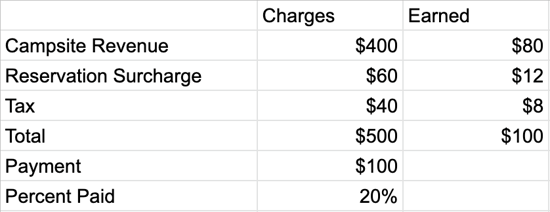Reports - Journal Entry (Cash Basis Quickbooks IIF)
This article will show you how to best interpret and use the information provided on the Journal Entry (Cash Basis - Quickbooks IIF) report.
Report Summary
- This report creates a journal entry to describe the balance of financial accounts across the specified date range in Quickbooks IIF format.
- The IIF format can only be directly imported into the desktop version of Quickbooks. You must have the desktop version of Quickbooks installed in order to open the report.
- This Journal Entry provides balances on a cash basis. This means that money is counted as revenue the day that it is received.
- This report only includes data for days in the past allowing for a faster download.
- Journal Entry reports contain fixed financial data. This means that if you download the report for yesterday's data today and download it again next week, the data will not change.
- Before downloading your Journal Entry, check that your park has financial account mapping completed as this ensures that the information on your Journal Entry is accurate. In order for the Journal Entry to be able to import into Quickbooks with error, the financial accounts in Campspot must match the accounts in Quickbooks exactly. If they do not match you will receive errors when attempting to import the IIF file.
- Accounting report data runs every night just after midnight in your park's local time. These reports typically run and are complete around 1am.
- This report can only be downloaded in CSV version.
Common Report Uses
- Financial reporting
- View taxable income or taxes collected after importing into Quickbooks
- Match report totals with the Total Payments Received report for the same date range to validate earnings.
Reports to Compare With or Supplemental Reports
- Journal Entry (Cash Basis - excludes today). This report will have the same information and can be viewed in CSV version but cannot be imported into Quickbooks.
- Journal Entry Construction (Cash Basis)
- Journal Entry Detail (Cash Basis - By Invoice & Account)
- Total Payments Received or Invoice Payment by Type
Please note: all reports listed above can be compared with the information that is imported from IIF file into Quickbooks
Common Report Questions
Q: What is the difference between a Cash Basis Journal entry and an Accrual Basis Journal Entry?
A: The differences between Cash Basis and Accrual Basis accounting are outlined below:
Cash Basis: A method of recording accounting transactions for revenue and expenses only when the corresponding asset is received or payments are made.
Example: Money received today for a reservation in the future is counted as revenue today.
Accrual Basis: A method of recording accounting transactions for revenue when earned and when expenses are incurred.
Example: Money received today for a reservation in the future will be counted as revenue when the reservation take place.
Q: Why won't this report import into Quickbooks Online?
A: The Quickbooks IIF Journal Entries can only import directly into the desktop version of Quickbooks. If your campground uses the online version then you will need to manually enter the information from another Cash Basis Journal Entry report.
Q: Why am I getting an error when attempting to import this Journal Entry into my desktop Quickbooks?
A: You may be getting errors if your financial account names and account IDs in Campspot do not exactly match the accounts in Quickbooks. To make updates to your accounts in Campspot you can go to Campground Setup > Accounting > Financial Accounts and locate the account you'd like to edit. You can make changes to the account name by clicking the checkbox next to it and then clicking the Edit button near the top right. Please note: Account Types cannot be edited.
Q: How can I find out what transactions make up the numbers I see in from this this import into Quickbooks?
A: The Journal Entry Detail (Cash Basis - By invoice & Account) report shows all invoices used to generate the cash basis Journal Entry for the specified date range. With this report, you can filter to show only certain accounts and locate the specific transactions you are seeking.
Note: Report totals may differ (by a penny or two) between the detail and non-detail versions as the Journal Entry rounds by account and not invoice and account.
Q: Why do certain charges in my revenue accounts not add up evenly to the number of charges I had during the reporting period?
A: Partially paid invoices require all charges present on the reservation to be partially paid as well. For example, if the reservation total is $500 and the deposit is $100, the breakdown of earned revenue for that day be the following...

Q: Why doesn't the amount for tax revenue match the amount on the Tax Income Report for the same date range?
A: These two reports are providing data for two different sets of reservations even though the date range may be the same and with that in mind, these should not be expected to match. The Journal Entry (Cash Basis - Excludes Today) shows data for everything that was paid for over the specified date range while the Tax Income report shows data for all reservations that occur over the specified date range. Many reservations are booked and paid for outside of the date range that they occur therefore these numbers would not match.
Q: If I make an edit to a past invoice will it change numbers on the Journal Entry for that day?
A: No. The data on all Journal Entries is fixed for financial reporting purposes. Changes or edits made to past invoices will not affect past Journal Entries. Changes are only reflected on the Journal Entry for the day that the change occurs.
.png?width=200&height=150&name=campspotlogo2019%20(1).png)